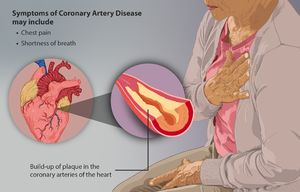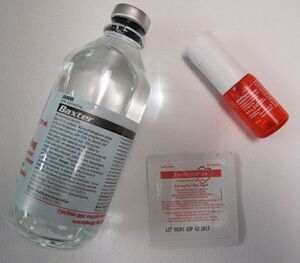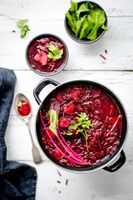Nitrates: Difference between revisions
No edit summary |
No edit summary |
||
| (2 intermediate revisions by the same user not shown) | |||
| Line 5: | Line 5: | ||
</div> | </div> | ||
== Introduction == | == Introduction == | ||
Nitrates are a class of medications that cause vasodilation. Nitrates exert their effects by dilating venous vessels, coronary arteries, and small arterioles; its maximal vasodilation is in the venous vessels. | [[File:Coronary Artery Disease.png|thumb|Coronary Artery Disease]] | ||
Nitrates are a class of medications that cause [[Vasodilators|vasodilation]]. Nitrates exert their effects by dilating [[Veins|venous]] vessels, [[Coronary Artery|coronary arteries]], and small arterioles; its maximal vasodilation is in the venous vessels. | |||
# Nitrates are primarily indicated for the treatment of angina, where preferential venodilation causes pooling of blood, decreased preload, and ultimately decreased | # Nitrates are primarily indicated for the treatment of [[angina]], where preferential venodilation causes pooling of [[Blood Physiology|blood]], decreased preload, and ultimately decreased [[Muscle: Cardiac|myocardia]]<nowiki/>l [[Oxygen|O2]] demand. | ||
# At high doses, nitrates can decrease afterload and may be used in hypertensive crises. The main adverse effects include headache, hypotension, and reflex tachycardia<ref>Lee PM, Gerriets V. [https://www.ncbi.nlm.nih.gov/books/NBK545149/ Nitrates.] InStatPearls [Internet] 2021 Jul 13. StatPearls Publishing.Available: https://www.ncbi.nlm.nih.gov/books/NBK545149/<nowiki/>(accessed 7.4.2022)</ref><ref>Lecturio Nitrates Available:https://www.lecturio.com/concepts/nitrates/ (accessed 7.4.2022)</ref>. | # At high doses, nitrates can decrease afterload and may be used in hypertensive crises. The main adverse effects include [[headache]], [[hypotension]], and reflex [[tachycardia]]<ref name=":0">Lee PM, Gerriets V. [https://www.ncbi.nlm.nih.gov/books/NBK545149/ Nitrates.] InStatPearls [Internet] 2021 Jul 13. StatPearls Publishing.Available: https://www.ncbi.nlm.nih.gov/books/NBK545149/<nowiki/>(accessed 7.4.2022)</ref><ref>Lecturio Nitrates Available:https://www.lecturio.com/concepts/nitrates/ (accessed 7.4.2022)</ref>. | ||
== | == Indications == | ||
[[File:Nitro.jpeg|thumb|3 forms of Nitroglycerin: IV; sublingual spray; nitroglycerin patch.]] | |||
The type of nitrates used and the administration route differs depending on the type of [[Cardiovascular Disease|cardiovascular disease]]. The use of nitrates is indicated in the following cardiovascular diseases: angina pectoris, [[Acute Coronary Syndrome|acute coronary syndrome]], arterial [[hypertension]], and [[Heart Failure|heart failure]]. The main types of nitrates are as followed: | |||
= | # Nitroglycerin (NTG): angina pectoris (treatment/prophylaxis), acute coronary syndrome, heart failure, hypertension. Various administration routes: Sublingual tablet; Transdermal patch; Ointment; Capsule; Spray; or IV | ||
# Isosorbide mononitrate (ISMN): chronic angina pectoris (treatment) Administration: Tablet; Sublingual tablet; or Spray | |||
# Isosorbide dinitrate (ISDN): angina pectoris (treatment/prophylaxis) Administration: Tablet or Tablet (Sustained release)<ref name=":0" />. | |||
== | == Types == | ||
# | # Short-acting nitrate preparations: eg Glyceryl trinitrate (GTN) tablets or sprays are commonly used to ease angina pains. | ||
# | # Long-acting nitrate preparations: A long-acting preparation takes longer to start working, so is not much use for immediate pain relief. But, it works for much longer after each dose than a short-acting preparation (which loses its effect after 20 minutes or so). | ||
== Side Effects == | |||
Common side-effects include: | |||
* A throbbing headache. | |||
* A flushed face. | |||
* Dizziness. | |||
* Lightheadedness (from the nitrate causing low blood pressure). | |||
* Feeling slightly nauseous. | |||
* With the spray under the tongue: a slight burning or tingling sensation under the tongue<ref>Patient Info Nitrate medication Available;https://patient.info/heart-health/nitrate-medication (accessed 7.4.2022)</ref>. | |||
== Do Nitrates lower blood pressure? == | |||
[[File:Beetroot.jpeg|thumb|200x200px|Beetroot ideas]] | |||
A 2015 study suggests the nitrates in many vegetables may keep blood vessels healthy and lower blood pressure. Previous studies have shown that a diet rich in fruits and vegetables, such as the Dietary Approaches to Stop HypertensionHypertension (DASH) diet, can reduce blood pressure.<ref>Kapil V, Khambata RS, Robertson A, Caulfield MJ, Ahluwalia A. Dietary nitrate provides sustained blood pressure lowering in hypertensive patients: a randomized, phase 2, double-blind, placebo-controlled study. Hypertension. 2015 Feb;65(2):320-7. Available:https://www.ncbi.nlm.nih.gov/pmc/articles/PMC4288952/ (accessed 7.4.2022)</ref> | |||
Foods to boost your nitric oxide levels include: Beets, rich in dietary nitrates, which your body can convert to nitric oxide; Garlic; Dark Chocolate; Leafy Greens; Citrus Fruits; Pomegranate; Nuts and Seeds<ref>Ask a lot of questions What drugs are considered nitrates? Available:https://askinglot.com/what-drugs-are-considered-nitrates (accessed 7.4.2022)</ref>. | |||
== Physiotherapy Relevance == | |||
Nitrates Clinical relevance when exercising | |||
# For acute use; hypotension and reflex tachycardia are common Monitor [[Heart Rate|HR]] and [[Blood Pressure|BP]]. | |||
# Prophlactic treatment; Monitor symptoms of hypotension, tachycardia and angina<ref>Heart Online Exercise response to cardiac medications Available: https://www.heartonline.org.au/media/DRL/Exercise_response_to_cardiac_medications.pdf (accessed 7.4.2022)</ref> | |||
== References == | == References == | ||
Latest revision as of 12:32, 7 April 2022
Original Editor - Lucinda hampton
Top Contributors - Lucinda hampton
Introduction[edit | edit source]
Nitrates are a class of medications that cause vasodilation. Nitrates exert their effects by dilating venous vessels, coronary arteries, and small arterioles; its maximal vasodilation is in the venous vessels.
- Nitrates are primarily indicated for the treatment of angina, where preferential venodilation causes pooling of blood, decreased preload, and ultimately decreased myocardial O2 demand.
- At high doses, nitrates can decrease afterload and may be used in hypertensive crises. The main adverse effects include headache, hypotension, and reflex tachycardia[1][2].
Indications[edit | edit source]
The type of nitrates used and the administration route differs depending on the type of cardiovascular disease. The use of nitrates is indicated in the following cardiovascular diseases: angina pectoris, acute coronary syndrome, arterial hypertension, and heart failure. The main types of nitrates are as followed:
- Nitroglycerin (NTG): angina pectoris (treatment/prophylaxis), acute coronary syndrome, heart failure, hypertension. Various administration routes: Sublingual tablet; Transdermal patch; Ointment; Capsule; Spray; or IV
- Isosorbide mononitrate (ISMN): chronic angina pectoris (treatment) Administration: Tablet; Sublingual tablet; or Spray
- Isosorbide dinitrate (ISDN): angina pectoris (treatment/prophylaxis) Administration: Tablet or Tablet (Sustained release)[1].
Types[edit | edit source]
- Short-acting nitrate preparations: eg Glyceryl trinitrate (GTN) tablets or sprays are commonly used to ease angina pains.
- Long-acting nitrate preparations: A long-acting preparation takes longer to start working, so is not much use for immediate pain relief. But, it works for much longer after each dose than a short-acting preparation (which loses its effect after 20 minutes or so).
Side Effects[edit | edit source]
Common side-effects include:
- A throbbing headache.
- A flushed face.
- Dizziness.
- Lightheadedness (from the nitrate causing low blood pressure).
- Feeling slightly nauseous.
- With the spray under the tongue: a slight burning or tingling sensation under the tongue[3].
Do Nitrates lower blood pressure?[edit | edit source]
A 2015 study suggests the nitrates in many vegetables may keep blood vessels healthy and lower blood pressure. Previous studies have shown that a diet rich in fruits and vegetables, such as the Dietary Approaches to Stop HypertensionHypertension (DASH) diet, can reduce blood pressure.[4]
Foods to boost your nitric oxide levels include: Beets, rich in dietary nitrates, which your body can convert to nitric oxide; Garlic; Dark Chocolate; Leafy Greens; Citrus Fruits; Pomegranate; Nuts and Seeds[5].
Physiotherapy Relevance[edit | edit source]
Nitrates Clinical relevance when exercising
- For acute use; hypotension and reflex tachycardia are common Monitor HR and BP.
- Prophlactic treatment; Monitor symptoms of hypotension, tachycardia and angina[6]
References[edit | edit source]
- ↑ 1.0 1.1 Lee PM, Gerriets V. Nitrates. InStatPearls [Internet] 2021 Jul 13. StatPearls Publishing.Available: https://www.ncbi.nlm.nih.gov/books/NBK545149/(accessed 7.4.2022)
- ↑ Lecturio Nitrates Available:https://www.lecturio.com/concepts/nitrates/ (accessed 7.4.2022)
- ↑ Patient Info Nitrate medication Available;https://patient.info/heart-health/nitrate-medication (accessed 7.4.2022)
- ↑ Kapil V, Khambata RS, Robertson A, Caulfield MJ, Ahluwalia A. Dietary nitrate provides sustained blood pressure lowering in hypertensive patients: a randomized, phase 2, double-blind, placebo-controlled study. Hypertension. 2015 Feb;65(2):320-7. Available:https://www.ncbi.nlm.nih.gov/pmc/articles/PMC4288952/ (accessed 7.4.2022)
- ↑ Ask a lot of questions What drugs are considered nitrates? Available:https://askinglot.com/what-drugs-are-considered-nitrates (accessed 7.4.2022)
- ↑ Heart Online Exercise response to cardiac medications Available: https://www.heartonline.org.au/media/DRL/Exercise_response_to_cardiac_medications.pdf (accessed 7.4.2022)









